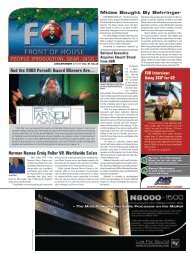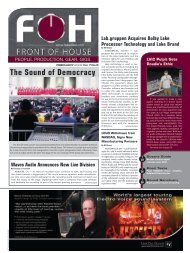You also want an ePaper? Increase the reach of your titles
YUMPU automatically turns print PDFs into web optimized ePapers that Google loves.
The backlash against ticket prices was<br />
clearly evident in Europe over the summer.<br />
Elton John, George Michael and<br />
The Who cancelled dates at big venues, while<br />
the Rolling Stones and Barbra Streisand<br />
played before vast tracts of empty seats.<br />
Ticket prices to see top acts have soared in<br />
recent years, driven by what some pop economists<br />
call “The Bowie Theory,” named for David<br />
Bowie, who years ago uttered a warning about<br />
the impact of online file sharing. Specifically,<br />
“Music itself is going to become like running<br />
water or electricity,” he advised. “You’d better<br />
be prepared for doing a lot of touring.”<br />
The theory suggests that bands that formerly<br />
kept concert prices low to help to sell<br />
albums and generate royalties, now regard live<br />
events as the best way to make money. A corollary<br />
to that might be, “Those who live by the<br />
sword, die by the sword.”<br />
Empty Seats and Cancelled Shows Biz<br />
Streisand’s show at Paris’ Bercy stadium was<br />
her first-ever at the venue, and promoters hiked<br />
the top ticket prices to almost $500. Yet 3,000<br />
seats went unsold. Her planned shows in Rome<br />
and Nice were called off, officially for technical<br />
reasons, after consumer groups campaigned<br />
against the prices. (To be fair, her U.K. shows<br />
in Manchester and London did all right.) Last<br />
February, Elton John cancelled a planned Paris<br />
mega-show, which had seats priced as high as<br />
$1,500, and replaced it with a gig at the Paris Zenith<br />
with a top ticket price of $300. The Stones<br />
played to a thin crowd at the Stade de France in<br />
Paris over the summer, and a gig in Belgium sold<br />
only 33,000 of 70,000 seats. George Michael and<br />
The Who abandoned plans to perform at the<br />
same venue and opted for a smaller hall.<br />
Are performing artists increasing the price<br />
of tickets to offset declines in record sales? Apparenty,<br />
they are if they think they can, and in<br />
Europe, at least, many of them guessed wrong.<br />
However, American promoters were more cautious<br />
with pricing. According to a list compiled<br />
by www.msn.com, many major touring acts<br />
kept a lid on prices:<br />
Beyonce: $47 to $125<br />
Smashing Pumpkins: $20 to $25<br />
Justin Timberlake: $54 to $155<br />
Genesis: $57 to $260<br />
Faith Hill & Tim McGraw: $49 to $97<br />
The White Stripes: $40 to $50<br />
Ozzfest: Free<br />
Supply Side — Rock ‘n’ Roll Style Biz<br />
Gary Bongiovanni, editor of touring business<br />
bible Pollstar, says U.S. promoters have<br />
cut the rate of ticket price increases this year<br />
and, significantly, he estimates that prices for<br />
the first half of the year were up only about 50<br />
cents (“cents” – not “percent”) on average from<br />
the year before. “And they’re still making a profit,<br />
and certain acts, like the Police, can still charge<br />
a couple of hundred dollars for the best seats<br />
without it skewing the average,” he says.<br />
European promoters likely will learn from<br />
their U.S. counterparts. Though live touring<br />
revenues have increased as recorded music<br />
revenues have decreased over the last 10<br />
years, and though in that time ticket prices<br />
have more then doubled, continuing to<br />
inflate those prices creates a backlash that<br />
ultimately stifles growth. More artists now<br />
receive most of their income from ticket sales,<br />
not CD sales. Labels Warner and Universal<br />
now are making participation in that revenue<br />
By DanDaley Tickets to Ride<br />
stream part of their strategy. The CD is folded<br />
into the concert package, even being given<br />
away, as Prince did in the U.K. earlier this<br />
summer, igniting a firestorm of protest from<br />
record distributors.<br />
Finding Balance Biz<br />
The leveling off of ticket prices in the U.S.,<br />
combined with the increasing sophistication<br />
of shows and the inclusion of premiums such<br />
as CDs, suggest a maturation of the live concert<br />
business. That’s good for the industry and,<br />
as Bongiovanni points out, might also illustrate<br />
that unlike the vise-like grip with which<br />
the major record labels controlled the pricing<br />
www.fohonline.com<br />
of recorded music, the concert business is a<br />
much more market-driven proposition.<br />
“Live concerts give everyone immediate<br />
feedback,” Bongiovanni explains. “The artist<br />
knows immediately how the fans like a song; if a<br />
promoter wants to charge $100 for a ticket and<br />
no one’s buying, they know that quickly, too.”<br />
Visceral matters affect the economics as<br />
well. Albums are not a real-time proposition<br />
— the process can start and stop as needed.<br />
Tours and the revenue they generate, however,<br />
depend on the ability and willingness of artists<br />
to stay on the road. While their CDs might<br />
have started out with a $17.95 list price, the<br />
ticket prices an artist can command vary from<br />
The Anklebiters The Biz<br />
year-to-year, even month-to-month, creating<br />
economic unpredictability. “There’s a flux in<br />
the concert business that wasn’t there in the<br />
record business,” says Bongiovanni.<br />
This uncertainty is ultimately good for the<br />
industry, bringing it back to the kind of meritocracy<br />
artistry demands. But the increasing<br />
influence in the concert space of large corporations<br />
such as AOL, AEG and Live Nation,<br />
whose shareholders and accountants demand<br />
predictability, suggests that the business is<br />
headed toward a crossroads. And the outcome<br />
of that will largely determine if the fate of the<br />
live music business will be the same as that of<br />
the recorded music business.<br />
2007 OCTOBER<br />
39<br />
Ad info:http:// foh.hotims.com
















